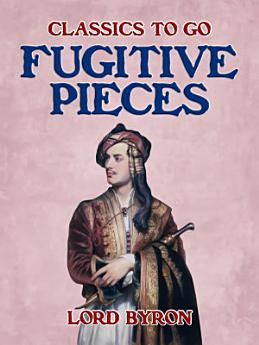Fugitive Pieces
Mar 2020 · Otbebookpublishing
Ebook
45
Pages
family_home
Eligible
info
reportRatings and reviews aren’t verified Learn More
About this ebook
Excerpt: "Fugitive Pieces, Byron's first volume of verse, was privately printed in the autumn of 1806, when Byron was eighteen years of age. Passages in Byron's correspondence indicate that as early as August of that year some of the poems were in the printers' hands and that during the latter part of August and during September the printing was suspended in order that Byron might give his poems an "entire new form." The new form consisted, in part, in an enlargement; for he wrote to Elizabeth Pigot about September that he had nearly doubled his poems "partly by the discovery of some I conceived to be lost, and partly by some new productions." According to Moore, Fugitive Pieces was ready for distribution in November. The last poem in the volume bears the date of November 16, 1806."
About the author
George Gordon Byron, 6th Baron Byron, commonly known as Lord Byron, was a towering figure of the Romantic era, whose life and works continue to captivate modern readers. Born on January 22, 1788, in London, Byron's aristocratic lineage and tumultuous personal life made him both a celebrated and controversial figure. His early years were marked by a clubfoot, which did not hinder his athleticism or his passionate pursuits.Byron's literary career skyrocketed with his vivid and emotive poetry, characterized by its exploration of individualism, nature, and the sublime. His works often reflected his own tempestuous experiences and unorthodox views, challenging societal norms and pushing the boundaries of literary expression. Byron's scandalous affairs, including rumored incestuous relationships and numerous liaisons with both men and women, fueled the public's fascination with him, making him a quintessential "bad boy" of literature.A fervent advocate for political freedom, Byron's revolutionary spirit led him to actively support the Greek War of Independence against Ottoman rule. His commitment to the cause was so profound that he spent his personal fortune and ultimately his life in Greece, where he died of fever on April 19, 1824, at the age of 36.Byron's influence extended far beyond his poetry; he inspired a generation of writers, including the likes of Percy Bysshe Shelley and John Keats, and his legacy can be seen in the works of later literary and artistic movements. His life, marked by defiance, passion, and a relentless quest for freedom, continues to resonate, making Lord Byron a timeless icon of Romanticism and a symbol of the rebellious spirit.
Rate this ebook
Tell us what you think.
Reading information
Smartphones and tablets
Install the Google Play Books app for Android and iPad/iPhone. It syncs automatically with your account and allows you to read online or offline wherever you are.
Laptops and computers
You can listen to audiobooks purchased on Google Play using your computer's web browser.
eReaders and other devices
To read on e-ink devices like Kobo eReaders, you'll need to download a file and transfer it to your device. Follow the detailed Help Center instructions to transfer the files to supported eReaders.






